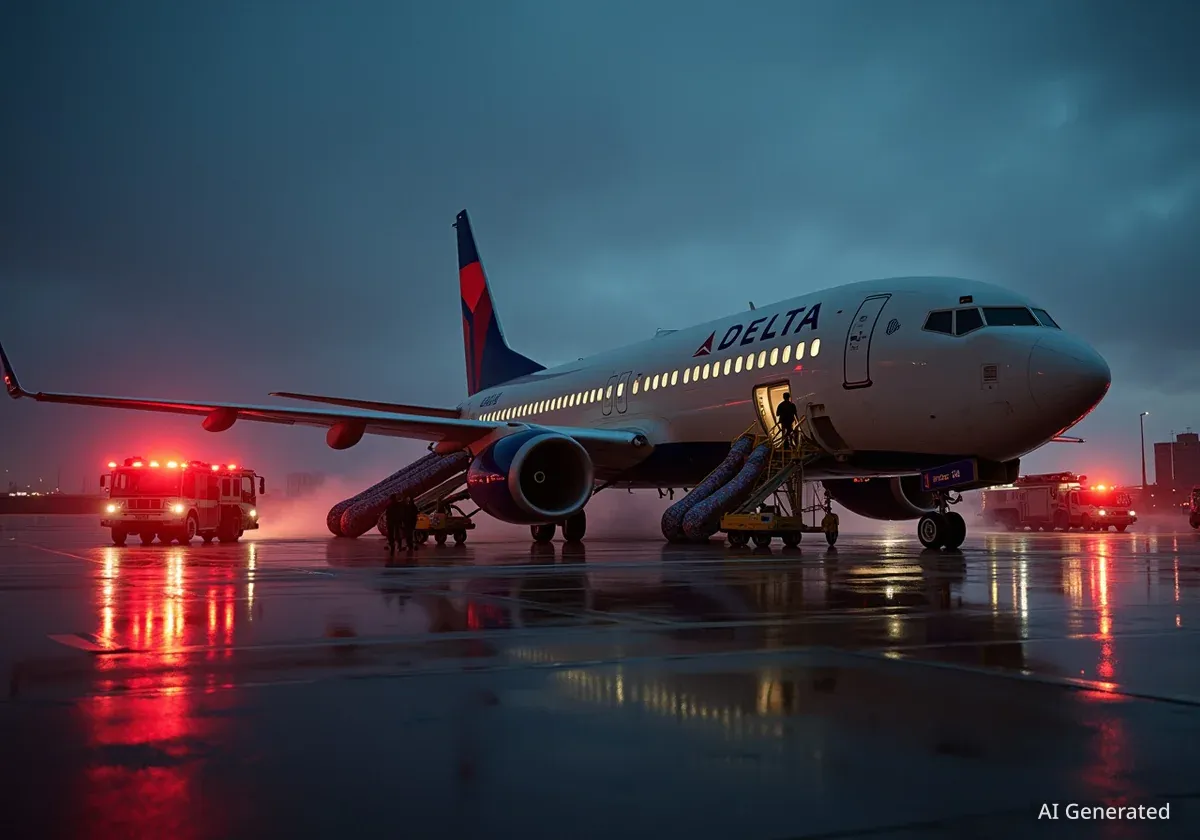A Delta Airlines flight bound for Portland, Oregon, was forced to abort its takeoff yesterday afternoon at Minneapolis-St. Paul International Airport. The incident occurred after a mechanical failure led to flames erupting from the right engine, causing an immediate return to the gate.
Passengers on Flight 1661 experienced a significant delay but were safely transferred to another aircraft. They ultimately arrived in Portland approximately two hours behind their original schedule.
Key Takeaways
- Delta Flight 1661 aborted takeoff at MSP.
- Flames were visible from the right engine due to mechanical failure.
- All passengers and crew remained safe.
- Passengers reboarded another plane and arrived two hours late.
Engine Failure Halts Departure
The incident unfolded as Delta Flight 1661 was preparing for departure from Minneapolis-St. Paul International Airport. The aircraft was on the runway, accelerating for takeoff, when the mechanical issue became apparent.
According to Delta spokesperson Bre’onna Richardson, the flight crew quickly identified the problem. They made the decision to abort the takeoff procedure and return the aircraft to the gate.
Video footage aired by "ABC World News Tonight" on Friday showed flames originating from under the plane's right wing while it was on the runway. This visual evidence confirmed the severity of the mechanical failure experienced by the aircraft.
Incident Details
- Airline: Delta Airlines
- Flight Number: 1661
- Origin: Minneapolis-St. Paul International Airport (MSP)
- Destination: Portland, Oregon (PDX)
- Issue: Mechanical failure, right engine fire
Passenger Safety and Reaccommodation
Ensuring passenger safety was the immediate priority following the aborted takeoff. All individuals on board Flight 1661 were safely deplaned once the aircraft returned to the terminal.
Delta Airlines quickly arranged for another plane to accommodate the delayed travelers. This prompt action minimized further disruption for the passengers.
"We apologize to our customers for their delay in travel," said Delta spokesperson Bre’onna Richardson in a prepared statement. This sentiment highlighted the airline's commitment to addressing passenger inconvenience.
Despite the unsettling experience of an aborted takeoff and visible engine flames, no injuries were reported among passengers or crew members. This underscores the effectiveness of emergency procedures and the rapid response from the flight crew.
Aviation Safety Protocols
Aborted takeoffs, while alarming, are a testament to stringent aviation safety protocols. Pilots are trained to identify and respond to mechanical issues during critical phases of flight, such as takeoff. Modern aircraft are equipped with multiple redundant systems and robust emergency procedures to ensure passenger safety even in unexpected situations.
Impact on Travel Plans
The unscheduled stop resulted in a two-hour delay for passengers en route to Portland. While inconvenient, the swift resolution by Delta ensured that travelers eventually reached their destination.
Travel disruptions can often lead to cascading issues, but in this instance, the airline's quick provision of an alternative aircraft helped mitigate broader impacts on travel schedules.
This incident serves as a reminder of the complex operations involved in air travel and the continuous need for vigilance and adherence to safety standards within the aviation industry.
Ongoing Investigation
While Delta has confirmed the mechanical failure, investigations into the precise cause of the engine fire are likely underway. Such incidents typically involve detailed inspections of the aircraft and its components to prevent future occurrences.
Aviation authorities and the airline will review all operational data and maintenance records. This thorough process helps maintain the high safety standards expected in commercial air travel.
- Safety First: The crew's decision to abort takeoff prioritized passenger safety above all else.
- Airline Response: Delta quickly provided a replacement aircraft and communicated with passengers.
- Minimal Delay: Despite the serious nature of the incident, the delay was limited to approximately two hours.
The smooth handling of the situation, from the immediate response by the flight crew to the efficient reaccommodation of passengers, prevented a more significant travel disruption for those aboard Flight 1661.





